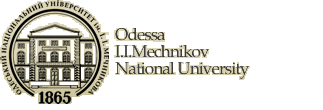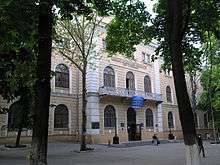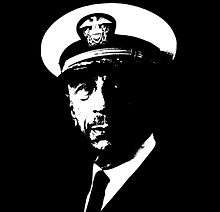Odessa University
| Одеський національний університет імені І. І. Мечникова | |
 | |
| Type | Public |
|---|---|
| Established | 1865 |
| Rector | Igor Koval |
Administrative staff | 1800 |
| Students | 7,500 |
| Location | Odessa, Ukraine |
| Campus | Urban |
| Website | www.onu.edu.ua |
The Odessa I. I. Mechnikov National University (Ukrainian: Одеський національний університет імені І. І. Мечникова, Russian: Одесский национальный университет имени И. И. Мечникова), located in Odessa, Ukraine, is one of the country's major universities, named after the scientist Élie Metchnikoff (who studied immunology, microbiology, and evolutionary embryology), a Nobel prizewinner in 1908. The university was founded in 1865, by an edict of Tsar Alexander II of Russia reorganizing the Richelieu Lyceum of Odessa into the new Imperial Novorossiya University. In the Soviet era, the University was renamed Odessa I. I. Mechnikov National University (literally, "Odessa National University named after I. I. Mechnikov").
During the century and a half of its existence, the University has earned the reputation of being one of the best educational institutions in Ukraine. The excellence of the University is also recognized outside Ukraine; Odessa National University is one of the highest-ranked universities in the world, occupying 48th place in one rating of universities worldwide.[1]
Odessa I. I. Mechnikov National University comprises four institutes, ten faculties, and seven specialized councils. The University is famous for its scientific library, the largest and oldest of any university in Ukraine (3,600,000 million volumes, ranging from the 15th century to the present day).[2]
Background

Odessa I. I. Mechnikov National University is one of the oldest in Ukraine. It was founded in 1865, when by Edict of the Russian Tsar Alexander II the Richelieu Lyceum (Рішелівський ліцей, which had existed in Odessa since 1817) was reorganized into the Imperial Novorossiya (New Russia) University. All academic and scientific life of the university - from the day of its foundation - was directed by the Statute of 1863 that formed the liberal-democratic tradition of the Higher Institution which has been preserved in spite of all the disturbances in the social and political life of the country. From the very first years of its existence, the Imperial Novorossiya University became an important center of science and for training the scientific and educational cadres of the northern Black Sea coastal region.
World-famous teachers and scientists have worked at Imperial Novorossiya University during different times of its existence, including the Nobel Prize winner I. I. Mechnikov (after whom University was later renamed), Professors I. M. Sechenov, A. A. Kovalevskiy, N. F. Gamaleya, N. Y. Zelinskiy, D. L. Mendeleyev, physicist G. A. Gamov,[3] mathematician A. M. Lyapunov, and others. Through their activities, the Imperial Novorossiya University quickly became one of the centers of the culture of the Ukrainian, Russian, and other peoples dwelling along the northern coast of the Black Sea, and the university began to play an important role in the development of science. The first Rector of the university was Professor I. Y. Sokolov. At different periods of time, the university was headed by Professors P. N. Lebedyev, A. l. Yurzhenko, A. V. Bogatskiy, V. V. Serdyuk, I. P. Zelinskiy—all prominent specialists in different branches of knowledge. At the present time, the Rector of Odessa I. I. Mechnikov National University is the Fellow of the Academy of Higher School of Ukraine V. A. Smyntyna, a specialist in surface physics.
Organization
Odessa I. I. Mechnikov National University is situated in two parts of the city and occupies summarily 70 hectares. The university is divided into a number of faculties. These faculties are directly administered by the university. Structurally, the University consists of 10 Faculties, 4 Institutes, College, two Preparatory Departments for citizens of Ukraine and foreign countries, 15 scientific-research laboratories, five scientific institutes, administration departments, experimental training shops and nine dormitories for students, post-graduates and trainees. The University has a sports- and health-rehabilitation complex with its own stadium and rest-base for the students, personnel and university guests in a picturesque section of Odessa, the village of Chernomorka. In all the areas of the University location, there are cafeterias, cafes, bars and medical sections.[4]
Education
- Department of Biology
- Department of Chemistry
- Department of Cybernetics
- Department of Geology and Geography
- Department of Economics and Law
- Department of History
- Department of Philosophy
- Department of Physics
- Department of Philology
- Department of Romance–Germanic Philology
- Institute of Mathematics, Economics and Mechanics
- Institute of Social Sciences
- Institute of innovation and postgraduate education
Science
- 11 Scientific research laboratories
- Botanic garden of ONU
- Scientific-Research Institute of Physics (director – Doctor of physics and mathematics Professor A.V. Tyurin)
- Astronomic Observatory
Ranking
Notable alumni

- Aleko Konstantinov - was a prominent Bulgarian intellectual who founded the tourist movement in Bulgaria
- Ali Mohamed Shein - currently the 7th President of Zanzibar
- Ion Nistor - was a prominent Romanian historian and politician
- George Gamow - a theoretical physicist and cosmologist – notably an early advocate and developer of Lemaître's Big Bang theory.
- Nikodim Kondakov - was a Russian historian, he founded modern method in Byzantine art history
- Mordechai Namir - Israeli minister
- Oksana Mas - Ukrainian artist
- Mariusz Zaruski - was a Brigadier-General in the Polish Army, a pioneer of Polish sports yachting
- Sergei Witte - was a precursor to Russia's first constitution, and Chairman of the Council of Ministers (Prime Minister) of the Russian Empire
- Ivan Sechenov - was a Russian physiologist
- Nikolai Chebotaryov - was a noted Russian and Soviet mathematician. He is best known for the Chebotaryov density theorem
- Krste Misirkov - he is one of the most outstanding names in the Macedonian culture and history
- Joshua L. Goldberg - was a Belarusian-born American rabbi, who was the first rabbi to be commissioned as a U.S. Navy chaplain in World War II (and only the third to serve in the Navy in its history), the first to reach the rank of Navy Captain (the equivalent of Army Colonel), and the first to retire after a full active-duty career
- Kadish Luz - was an Israeli politician who served as Minister of Agriculture between 1955 and 1959 and Speaker of the Knesset from 1959 and 1969
- Vladimir Ippolitovich Lipsky - was a Ukrainian scientist, botanist; a member of National Academy of Sciences of Ukraine (in 1922—1928 — its President) and corresponding member of the USSR Academy of Sciences, and the Director of the Botanical Gardens of the Odessa University
- Gherman Pântea - was subsequently Military Director of the Moldavian Democratic Republic
- Alla Dzhioyeva - is a South Ossetian teacher turned politician, who served as the Education Minister in 2002–2008
- Streltsov Ievgen - prominent Ukrainian Professor
- Emmanuil Galitskiy - Original staff member and head physics professor at the Bergen County Academies
- Volodymyr Kedrowsky - Ukrainian military leader, diplomat, author, and activist
- Pyotr Karyshkovsky - Ukrainian Soviet historian, numismatist, a scholar and lexicographer.
See also
References
External links
| Wikimedia Commons has media related to Odessa University. |
- Odesa I. I. Mechnikov National University
- Odesa I. I. Mechnikov National University -- press service
- Odesa I. I. Mechnikov National University page on Facebook
- Odessa National University